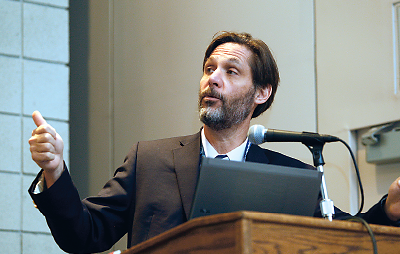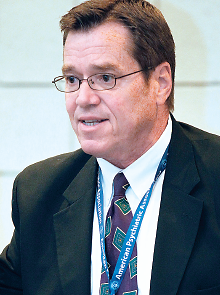Is There a Place for PAs in Psychiatric Practice?
Abstract
With several types of nonphysician health professionals competing for turf in the mental health arena, some clinicians may have mixed feelings about the addition of physician assistants to psychiatric practices.
As the number of medical school graduates entering psychiatry residencies remains relatively steady, the anticipated demand for psychiatric services—in the midst of changes stemming from health care reform—will steadily increase. Some experts think that pushing for more training in psychiatry for physician assistants (PAs) to join psychiatric practices may be one way to meet growing demand for mental health care.

Michael Flaum, M.D., discusses the potential role of physician assistants in psychiatric practice, noting that “currently there are too few providers in psychiatry.”
“Currently, there are too few providers in psychiatry . . . and an overreliance on emergency services to treat patients with mental illness,” Michael Flaum, M.D., a professor in psychiatry at the University of Iowa, said in May at an APA annual meeting session titled “Physician Assistants in Psychiatry: The Bottom Line on Benefits to Your Practice.” To meet the demands of rising patient numbers, Flaum said that it is time do business differently.
As the movement toward integrating general medical care and mental health care proceeds, Director of the APA Office of Healthcare Systems and Financing Irvin (Sam) Muszynski, J.D., told Psychiatric News that APA will be exploring agendas with the American Academy of Physician Assistants as part of APA’s integrated care initiatives.
PAs are nationally certified and state-licensed to practice medicine as part of a medical team under the supervision of physicians.

Greg Thomas, P.A.-C., M.P.H., points out that physician assistants are “not replacements for physicians.”
Since the first PA educational program at Duke University in 1967, the graduation rate for PAs has increased from four people a year to 7,000 today, said Greg Thomas, P.A.-C, M.P.H, director of external relations at the National Commission on Certification of Physician Assistants (NCCPA), at the annual meeting session.
Thomas explained that the typical curriculum for an accredited PA program is a 27-month master’s degree program that is based on a medical-education model consisting of one year of didactics and a second year of clinical rotations—which includes a rotation in psychiatry as an option.
“There are roughly 100,000 certified practicing PAs in the United States,” with approximately 1,500 of them working in psychiatry, Thomas told Psychiatric News. “Psychiatry is definitely one of the areas with the fewest PAs.”
The NCCPA has begun reaching out to physician organizations representing specialties in which PA utilization is low, which led NCCPA to propose this session at the APA annual meeting.
The session provided an overview of the most common clinical skills performed by PAs in psychiatry, which include evaluation and initiation of treatment of patients in psychiatric crisis, maintenance and management of pharmacotherapy, individual and group counseling, and telepsychiatry. PAs are allowed to prescribe certain medications with physician oversight in all 50 states, Washington, D.C., and U.S. territories except Puerto Rico. In most states, PAs are authorized to prescribe Schedule II to Schedule V drugs.
Currently, the NCCPA is urging PAs who want to join a collaborative team in psychiatric practices to obtain the Certificate of Added Qualifications (CAQ) in psychiatry, a new specialty credential that is held by about 10 percent of the certified PAs working in psychiatry.
Under CAQ requirements, prospective candidates will have to work 2,000 hours (the equivalent of one year) and earn 150 Category 1 CME credits related to psychiatry within the six years prior to applying for the CAQ exam, in addition to earning 50 CME credits within the two years after taking the exam. The CAQ will not be acquired until A supervising psychiatrist has provided an attestation indicating that the PA is fully competent to carry out procedures—such as psychiatric interviewing and crisis intervention—that are important in psychiatric practice.
Conference attendee Sul Russ Olen Thorward, M.D., a psychiatrist practicing in Alaska, praised the session for providing information that is essential to his practice. “I have had a PA that I’ve been working with for six months,” Thorward told Psychiatric News. “She worked for 20 years as a PA in general practice. The session was really helpful in clarifying the training requirements for her to be qualified within psychiatry.”
Thorward emphasized that incorporating more PAs in psychiatric practices can be of great benefit. However, not all attendees agreed.
Caroline Fisher, M.D., Ph.D., a child and adolescent psychiatrist at Sumatran Health Services in Oregon, said that while she realizes that demands for psychiatric service are outpacing the number of psychiatrists available to provide them, she has serious reservations about extending PAs into psychiatric practice.
Fisher stressed that setting a clear understanding of each person’s role in the medical practice will be of utmost importance as more PAs are incorporated into psychiatric practice. She said that the best use of PAs in psychiatric practices is for them to treat and manage the medications of patients with less-severe mental disorders, allowing physicians more time to spend on treating those with complex illnesses.
In response to these concerns, Thomas stressed that PAs will never be replacements for physicians. “The PA profession was started by physicians and will always be linked to physicians. The doctor is the supervisor.” Thomas concluded that PAs are about “teams,” which is particularly relevant as integrated care becomes more entrenched as a medical practice model in the next several years.
Harsh Trivedi, M.D., chair of APA’s Council on Healthcare Systems and Financing and executive director and chief medical officer in behavioral health at Vanderbilt University, told Psychiatric News, “We can either choose to embrace the changes that are coming or continue to fight and say that anyone outside of a psychiatrist is simply not good enough—the problem is that that argument has not worked very well.”
Trivedi explained that by using a physician “extender,” psychiatrists will be able to provide more psychiatric services to their patients—benefiting the practice and, more importantly, meeting patients’ mental health care needs.
“The reality is that, if we cannot meet the entire needs of our patient population, people will find other ways of getting those needs met.” ■
Information about added certification in psychiatry for PAs can be accessed here.



